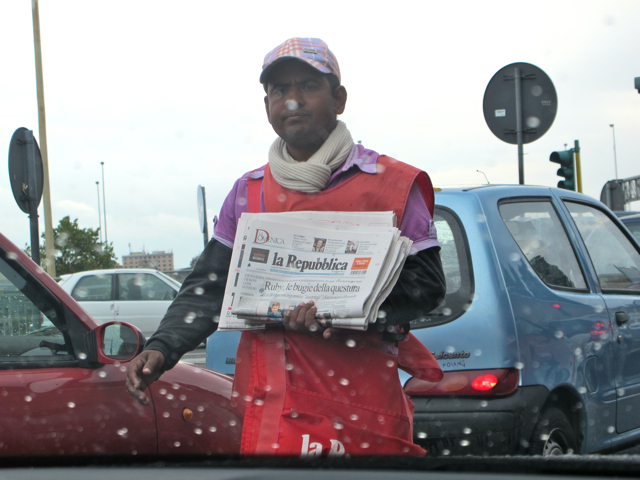A month after Boston’s Patriot Day bombings, the world’s eyes were drawn to Woolwich, a previously unheard of district in south London. Two Muslim converts of Nigerian descent had run over British Army Private Lee Rigby, following which they used knives and a cleaver to hack him to death. After dragging his corpse into the road, a recorded conversation took place with one of the attackers. His hands covered in blood, one of the attackers – Michael Abdebolajo – blamed the murder on British foreign policy.
The video quickly made it online, and went viral. For those inclined towards Islamophobia, it was a spectacularly explicit confirmation of Muslim barbarity. Never mind the political message intended by the attacker. His religion was the problem. Hence, the outbreak of anti-Muslim violence and street protests in the United Kingdom during the weeks that followed. Rigby’s murder gave license to rightwing Britons to once again broadcast the superiority of their civilization over the primitive and base behaviors of immigrants and minorities.
There’s no arguing that Rigby’s killing was wrong and unjustified. The problem was that it was exploited as an opportunity to promote rightist ideology. From the extremist English Defense League, and the British National Party, to UKIP and the Tories, the Woolwich attack offered a boost to the worst elements in British politics. There was a little something for everyone on the right, providing the illusion of political consensus across its ranks, as though every conservative is a member of the same party. Albeit, every white Briton.
Indeed, British media have made much, as of late, over the upsurge in Islamophobia in the country, following Woolwich. So much so that it is tempting to blame the attack for the prejudice, as appears to be a concern of its coverage. Unfortunately, such assumptions miss the point – not just because they play into a prejudicial narrative of blaming the victim. Rather, because they ignore how intolerant Anglo societies, like those of Britain, and the United States, have become over the last decade.
As evinced by the continued popularity of Samuel Huntington’s Clash of Civilizations thesis, an increasingly us versus them discourse, in reference to the Muslim world, has permeated public perception of the War on Terror since the conflict’s start twelve years ago. Whenever a terrorist succeeds, inevitably, they give fodder to those who would say that this conflict is one of values, of Western democracy against Islamofascism. Broadcast and tabloid news media have played a major role in perpetuating this idea, promoting xenophobic ideas, as though they are the only way to interpret their sensationalist presentation of current events. Whether for clear political motives, or a means of attracting eyeballs, the effect is always the same.
Conservatives metaphorically own this editorial department of the news media. The content, and presentation, is entirely in keeping with their ideas. Obviously, mainstream media also, inadvertently or not, nurture the right this way. However, not everyone buys into these sorts of narratives. There are nearly as many news consumers who attribute it to a continued decline in journalistic legitimacy.

Take, for example, how American news media demonstrated this during their Boston bombings coverage, whether it was CNN speculatively calling the suspect a “dark-skinned male,” or the New York Post using the headline ‘Bag Men’ against a photo of vaguely Middle Eastern-looking men. Social media were not innocent, either, most notably in the death of Brown University student Sunil Tripathi, who was subject to a malicious rumor on Reddit about his culpability. Taking their lead from CNN and the Post, Reddit users went hog wild, attempting to crowdsource responsibility to American minorities who looked like them.
Ideally, news outlets ought to be a source of objective information, not of half or whole mistruths, which lead to further stigmatization of the marginalized. Social media included, however biased and ill-trained they might naturally be. However, the Patriots’ Day blasts unerlined their dangerous potential to fan suspicion and misplaced anger in precisely this way. This is especially true in an age when consumers are encouraged to demand instant information for the sake of their own comfort, which cannot help but be crude and speculative.
There are two obvious problems that result from this situation. The first is that all of this comes at the expense of meaningful analysis, especially when such complex issues as Salafi terrorism (the Boston bombers were Salafists) is involved. Sophisticated analyses about such religious ideologies, and their political consequences, are virtually non-existent in mainstream news media. But when they do take place, what emerges is a disjointed array of vague talking points that leave audiences completely unable to navigate why certain types of terrorist violence occur. At best, this inspires a tendency towards oversimplification.
The end result is a terrified, not an informed, news-consuming public, whose fears are continually reinforced by the media that they follow. This may seem facile to point out, but the idea of a 24-hour news channel starving its audiences of information, despite having the time and the resources to provide it meaningfully, and objectively, is a travesty. Presenting news this way only serves to reinforce the public’s hopelessness and anxiety. As we well know, these aren’t exactly the best recipes for thoughtful, albeit progressive reactions to serious political crises.
What I would like to see, as I imagine many other persons of minority background would, is a way for news media to hold itself accountable, such that it can report on things like terrorist acts, carried out by marginalized persons, without further fanning the flames of resentment against their communities. Certainly, there are many center-left news publications and broadcasts that address this issue quite expertly in their coverage. However, even with globally read, minority-friendly broadcasters such as Al-Jazeera English, and increasingly international newspapers like The Guardian, it is hard to find evidence that their reporting is making that kind of difference.
Sure, they are able to break great stories, which shake up the establishment, such as The Guardian’s present PRISM scoop. More power to them, as though that needs to be said. I guess I’m looking for something a little more hard to quantify, and perhaps, something that, more importantly, might best exist outside the sphere of liberal news media.
Photographs courtesy of Joel Schalit





